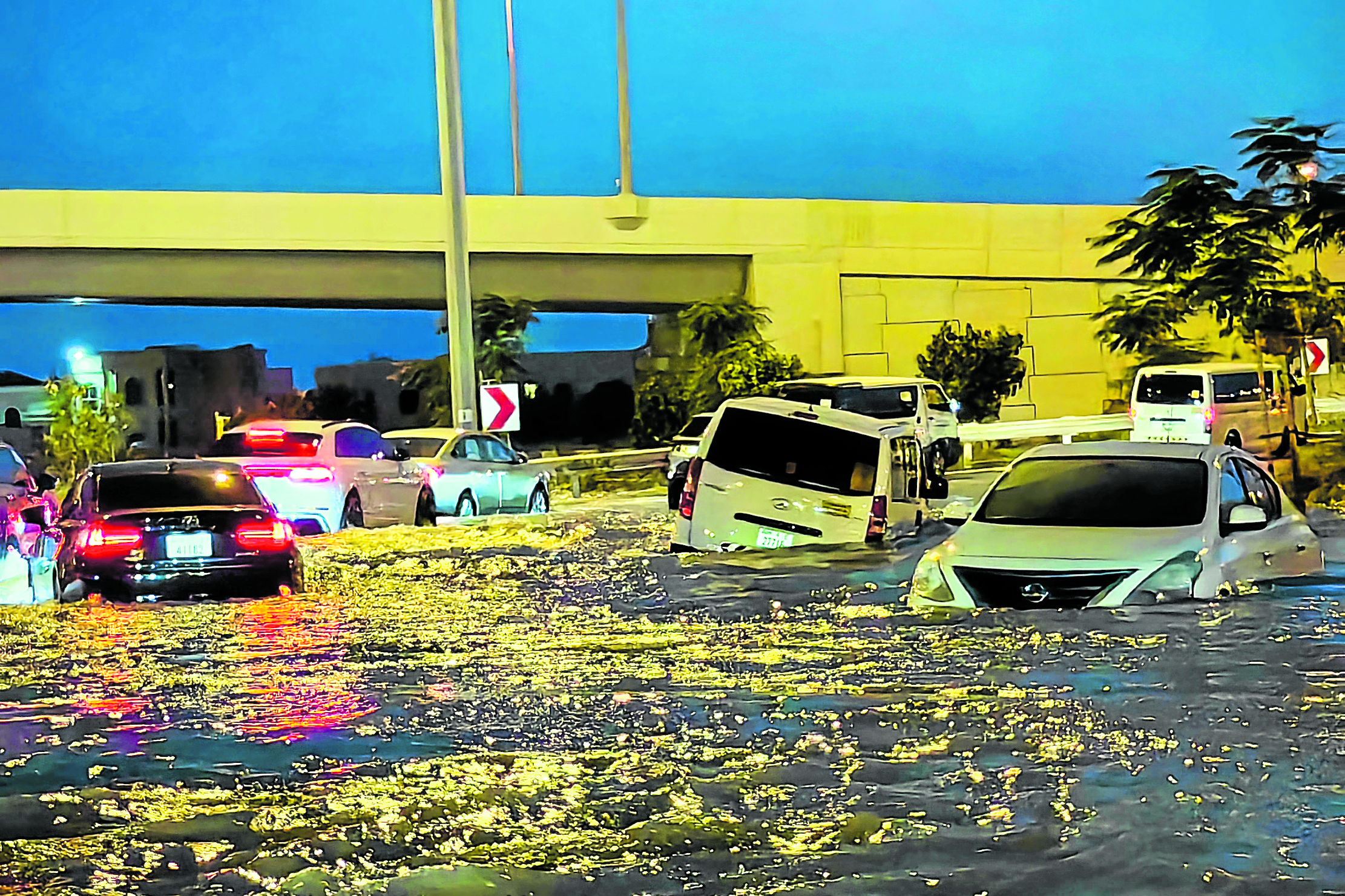3 OFWs dead in UAE flooding

Cars drive in a flooded street following heavy rains in Dubai on April 17, 2024. Dubai, the Middle East’s financial centre, has been paralysed by the torrential rain that caused floods across the UAE and Bahrain and left 18 dead in Oman on April 14 and 15. (Photo by Giuseppe CACACE / AFP)
Three overseas Filipino workers (OFWs) in the United Arab Emirates (UAE) have been counted among the fatalities in the massive flooding caused by record rains in the desert nation this week.
Department of Migrant Workers (DMW) Officer in Charge Hans Cacdac did not identify the victims but said two of them were women.
READ: DMW: 3 Filipinos dead due to flooding in UAE
“The two (women) died due to suffocation inside their vehicle during the flooding,” Cacdac said in a statement on Thursday night.

“The third died due to major injuries sustained from an accident when his vehicle fell into a sinkhole at the height of the flooding,” he added.
Cacdac said DMW officers and the Overseas Workers Welfare Administration offices in Dubai and Abu Dhabi would provide “all assistance” to the families of the three OFWs.
READ: Dubai: Floods submerge roads, affect airport after record rains
There are at least 421,686 Filipinos in Dubai as of June last year, according to the Department of Foreign Affairs.
The rains on Tuesday were the heaviest experienced by the Gulf state in the 75 years that records have been kept.
Airport operations
The rains unleashed a deluge that paralyzed Dubai, including the operations of Dubai International Airport, one of the world’s busiest airports.
Emergency workers tried to clear waterlogged roads and people assessed the damage to homes and businesses on Thursday.
Dubai International Airport struggled to clear a backlog of flights and many roads were still flooded in the aftermath of Tuesday’s deluge.
Dubai Airports Chief Operating Officer Majed Al Joker told state news agency WAM on Thursday that Dubai International Airport would return to its full operational capacity within 24 hours.
READ: Dubai reels from floods chaos after record rains
“Once operations are back to normal, we will assess the damage and would be able to give figure for the size of losses,” Al Joker told Al Arabiya TV in a televised interview.
Flooding trapped residents in traffic, offices and homes. Many reported leaks at their homes, while footage circulated on social media showed malls overrun with water pouring from roofs.
Traffic remained heavily disrupted. A highway through Dubai was reduced to a single lane in one direction, bringing traffic to a standstill, while the main road that connects Dubai with Abu Dhabi was closed in the Abu Dhabi direction.
In Dubai, some vehicles, including buses, were almost entirely submerged in water. Long queues formed at petrol stations.
Emergency workers used a fire truck to pump water from a road flooded in nearly waist-deep water as drivers tried to pass, navigating around abandoned vehicles.
The storm, which hit neighboring Oman on Sunday, pounded the UAE on Tuesday, flooding roads and causing hourslong gridlock as rainwater inundated homes. One person was reported dead in the UAE and 20 in Oman.
Authorities have also told government employees and students to stay home while roads are cleared.
While some roadways into hard-hit communities remain flooded, many groceries began to restock shelves, though fresh products still appeared in shorter supply than usual.
Delivery services across Dubai, where residents are used to ordering everything at the click of a button, slowly began returning to the streets after being largely out of service for two days.
Rare
Rainfall is rare in the UAE and elsewhere on the Arabian Peninsula, which is typically known for its dry desert climate. Summer air temperatures can soar above 50 degrees Celsius.
Following Tuesday’s events, questions were raised whether cloud seeding, a process that the UAE frequently conducts, could have caused the heavy rains.
But climate experts said global warming was the main culprit behind extreme weather events.
Researchers anticipate that climate change will lead to heightened temperatures, increased humidity and a greater risk of flooding in parts of the Gulf region. The problem can be worsened in countries like the UAE where there is a lack of drainage infrastructure to cope with heavy rains.
A UAE government agency that oversees cloud seeding—a process of manipulating clouds to increase rainfall—denied that any such operations took place before the storm.
President Sheikh Mohammed bin Zayed Al Nahyan, in a statement, said that he had ordered authorities to assess the damage and provide support to families impacted by the storm. —WITH REPORTS FROM REUTERS